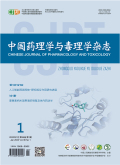中国药理学与毒理学杂志2024,Vol.38Issue(4):286-293,8.DOI:10.3867/j.issn.1000-3002.2024.04.006
治疗阿尔茨海默病创新药物研发进展
Advances in development of innovative drugs for Alzheimer disease
摘要
Abstract
Alzheimer disease(AD)is a degenerative disease of the central nervous system,which is characterized by progressive cognitive decline and behavioral impairment,and has no effective prevention and treatment because of its complex pathogenesis.In recent years,targeted therapies based on the pathogenesis and pathology of AD have come to be the focus of new drug development.The targeted drugs amyloid monoclonal antibody aducanumab and lecanemab were approved by the US FDA for the treatment of AD,and GV-971 was approved in China.Innovative drugs such as β-secretase inhibitors,anti-Aβ vaccines,tau protein aggregation inhibitors,and γ-secretase inhibitors have also shown therapeutic potential for AD and entered clinical trials.This paper is intended to sum-merize the recent research progress in innovative drugs for the treatment of AD and analyze the strate-gies of innovative drug development in order to provide reference and ideas for the treatment of AD and the development of related new drugs.关键词
阿尔茨海默病/靶向药物/β分泌酶/tau蛋白/单克隆抗体/疫苗Key words
Alzheimer disease/targeted drugs/β-secretase/tau protein/monoclonal antibody/vaccines分类
医药卫生引用本文复制引用
肖雨薇,胡伟强,赵梦华,连俊荣,温金华..治疗阿尔茨海默病创新药物研发进展[J].中国药理学与毒理学杂志,2024,38(4):286-293,8.基金项目
国家自然科学基金(82360734) (82360734)
江西省科技合作项目(20232BBH80007) National Natural Science Foundation of China(82360734) (20232BBH80007)
and Jiangxi Province Science and Tech-nology Cooperation Project(20232BBH80007) (20232BBH80007)

